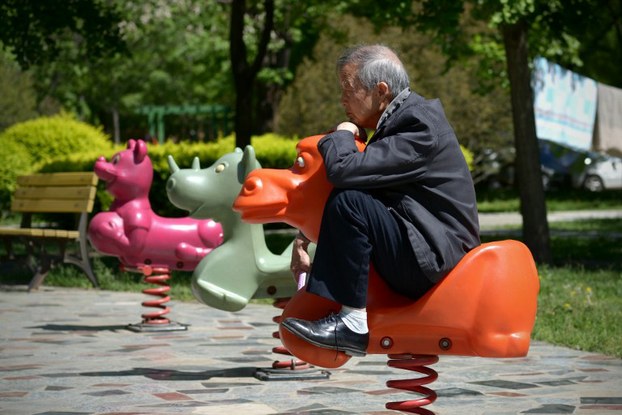Elderly bereaved parents blame lack of pension on China's one-child policy
| Publisher | Radio Free Asia |
| Publication Date | 6 May 2015 |
| Cite as | Radio Free Asia, Elderly bereaved parents blame lack of pension on China's one-child policy, 6 May 2015, available at: http://www.refworld.org/docid/555edb5434.html [accessed 27 June 2017] |
| Disclaimer | This is not a UNHCR publication. UNHCR is not responsible for, nor does it necessarily endorse, its content. Any views expressed are solely those of the author or publisher and do not necessarily reflect those of UNHCR, the United Nations or its Member States. |
2015-05-06
 An elderly man sits on a hobby horse at a residential area in Beijing, May 4, 2015. AFP
An elderly man sits on a hobby horse at a residential area in Beijing, May 4, 2015. AFP
Hundreds of elderly, bereaved parents from across China protested outside government offices in Beijing on Wednesday over a lack of government support, blaming their poverty on the country's draconian one-child population controls.
Some 800 elderly people whose grown children have died gathered outside the Ministry for Health and Family Planning in Beijing, holding banners amid a strong police presence, protesters told RFA.
Photos of the protest circulated online showed banners which read: "Who should bear the risk of government policies," and "If you want to make the Chinese dream come true, ease the pain of bereaved parents!"
Others wore T-shirts with the slogan: "Our family line was severed by the one-child policy!"
"There are a lot of police and police vehicles, as well as buses, outside the Family Planning Commission," a protester surnamed Zhang said, using the former name of the department. "They plan to escort people home; there are several buses from [the northeastern city of] Shenyang alone."
He said all of those present had been forced to adhere to the one-child policy during the 1980s, after which their grown children died for various reasons when they were too old to have another child.
"We have nobody to take care of us or keep us, no children, and yet the amount they give us is barely a subsistence level; we can't live on it," Zhang said. "If we need to be admitted to hospital, then that's a lot of money we have to pay."
Avoiding the issue
Activists estimate that more than a million elderly people whose only child has died have been left with scant financial support in their old age.
The protesters argue that the government owes them a living because they complied with the one-child policy out of a sense of public responsibility, not out of personal choice.
A 53-year-old protester from the northeastern province of Jilin, who gave only her nickname A Fang, said the government is avoiding the issue.
"They can't avoid this," A Fang said. "If they evade it today, it'll still be there tomorrow."
"The more they try to dodge the issue, the more of a rebellious spirit there will be."
She said she agreed with the one-child policy, however.
"The one-child policy was correct, but whether it was correct or not, they've implemented it, and so they should have thought about the consequences sooner," A Fang said.
"They have never done addressed this issue properly."
Calls to three publicly listed phone numbers for the Beijing Family Planning Commission rang unanswered during office hours on Wednesday.
Protecting the elderly
Zhao Min, an elderly protester from Hebei province, said she had lost her only son at the age of 16 in an attack by five drunken young men, who had since managed to evade arrest.
"Everyone knows how important a place their children hold in parents' hearts," Zhao said. "There's nothing that compares to it."
"We're not asking for much: we think the government's laws are right, but we have lost our children, and we want . . . justice. Then we'll be satisfied," she said.
Since last July, a new law has required the grown children of elderly Chinese parents to visit them.
The new rules form part of an amendment to China's existing Law on Protection of the Rights and Interests of the Elderly People, and requires family members to visit the elderly more often, as well as outlawing domestic violence against older people.
Officials have predicted that one-third of China's population will be over the age of 60 by 2050, and the law appears to be directed towards the needs of this sector of the population in an era where access to pensions, healthcare and secure accommodation is far from universal.
The law states that adult children have a responsibility to take care of their aged parents, both economically and psychologically.
It adds that elderly people are free to marry whom they choose, where they are legally free to do so, although the responsibility of grown children to support their parents is constant, regardless of the older person's marital status.
However, the law does not define an appropriate frequency of visits, nor any penalty for adult children who do not comply.
Critics have said government support for the elderly in the form of adequate pensions and social welfare would be a more appropriate way to ensure their well-being.
Reported by Wen Yuqing for RFA's Cantonese Service, and by Qiao Long for the Mandarin Service. Translated and written in English by Luisetta Mudie.
Link to original story on RFA website
